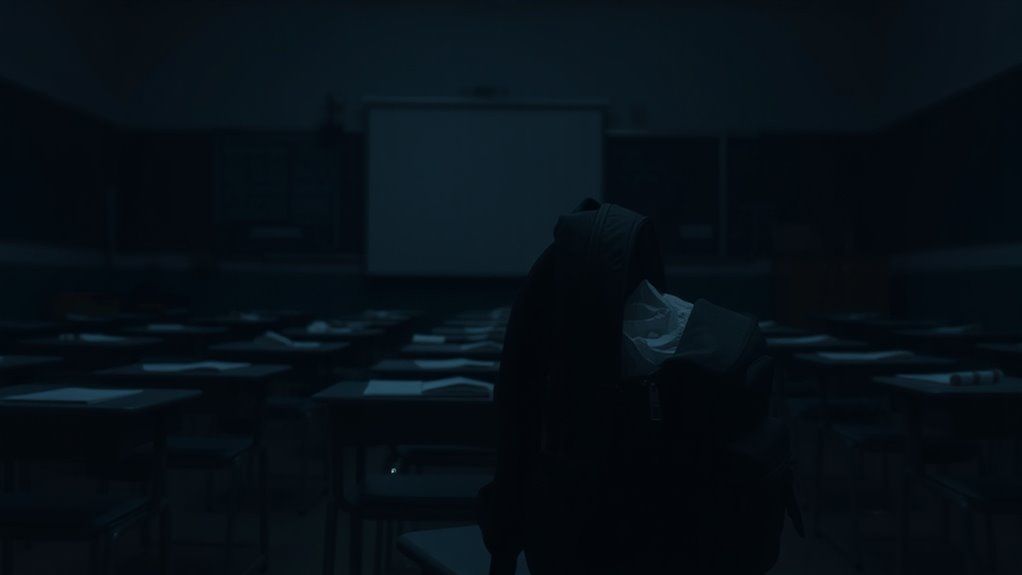Your classroom anxiety dreams often reflect deeper feelings of imposter syndrome, where you doubt your abilities and fear exposure. These dreams show you feeling unprepared, overwhelmed, or unfairly judged, amplifying worries about grades and peer comparison. They reveal your internal struggles with self-worth and confidence. Recognizing this link can help you understand your fears better. If you want to explore how these dreams point to underlying self-doubt and ways to cope, there’s more to uncover.
Key Takeaways
- Classroom anxiety dreams often reflect imposter syndrome by highlighting fears of being unqualified or inadequate.
- Both phenomena involve internalized pressure to succeed and fear of exposure or failure.
- Dreams of being unprepared or judged mirror imposter feelings of fraudulence and self-doubt.
- Persistent comparison and perfectionism intensify classroom anxiety, reinforcing imposter syndrome beliefs.
- Recognizing these dreams helps address underlying self-perceptions, fostering confidence and reducing anxiety.

Many educators and students alike find themselves plagued by classroom anxiety dreams, where they wake up feeling unprepared or overwhelmed. These dreams often reflect underlying worries about performance, especially when it comes to grading stress and peer comparison. You might dream of standing in front of a class, unsure of your material, or see your grades marked with failures you can’t explain. These recurring themes reveal how deeply your mind internalizes the pressure to succeed and the fear of falling short compared to others. It’s common to feel that no matter how much effort you put in, it’s never quite enough, fueling the cycle of anxiety and self-doubt.
Classroom anxiety dreams reveal deep fears of inadequacy and constant pressure to succeed.
Grading stress plays a significant role in these dreams. When you’re anxious about your evaluations, whether as a student or educator, your subconscious amplifies those fears during sleep. You might imagine giving a test and seeing students’ disappointed faces, or wake up worried about your own performance on an upcoming exam or assignment. This stress isn’t just about the grades themselves but what they represent—your competence, your worth, your ability to meet expectations. The pressure to maintain high standards can make you obsess over every detail, and when you struggle to meet those standards, your mind may create worst-case scenarios in your dreams, adding to the sense of dread.
Peer comparison is another powerful trigger. When you constantly compare yourself to classmates or colleagues, it becomes easy to feel inadequate or behind. These comparisons often lead to feelings of imposter syndrome, where you believe you don’t belong or aren’t truly qualified. Your subconscious may conjure dreams where you’re exposed as a fraud, or where others surpass you effortlessly. These visions reinforce the idea that you’re not good enough, which feeds back into your waking anxiety. The more you compare yourself to others, the more your mind magnifies perceived shortcomings, creating a cycle of doubt that seeps into your sleep.
Additionally, understanding the role of anime movies and their storytelling techniques can help you gain perspective on overcoming internal struggles. Recognizing that these dreams aren’t just random night-time fears; they mirror your real-life struggles with grading stress and peer comparison. They highlight how deeply these issues affect your sense of identity, confidence, and belonging in the classroom environment. Recognizing that these dreams stem from your concerns can be the first step toward addressing them. When you understand their roots, you can work on managing your grading anxiety and cultivating self-compassion. Remember, everyone faces these internal battles, and waking up feeling overwhelmed doesn’t mean you’re failing—it means you’re human.
Frequently Asked Questions
Can These Dreams Predict Future Academic Success or Failure?
You might wonder if these dreams can predict your academic future. While dream symbolism and anxiety patterns reveal your subconscious worries, they don’t directly forecast success or failure. Instead, they highlight areas where you might need support. Recognizing these patterns helps you address underlying fears, boosting confidence. Remember, your dreams reflect current stress, but your actions and mindset ultimately shape your academic path.
How Do Cultural Differences Influence Classroom Anxiety and Imposter Feelings?
Did you know that students from collectivist cultures report 30% higher classroom anxiety than those from individualistic ones? Cross-cultural perceptions and educational norms deeply influence imposter feelings and classroom anxiety. In some cultures, success is seen as a shared achievement, reducing imposter syndrome, while others emphasize individual achievement, heightening self-doubt. Your background shapes how you perceive academic challenges, impacting your confidence and feelings of belonging in the classroom.
Are There Specific Personality Traits Linked to These Dreams?
You might notice that certain personality traits influence your dream patterns related to anxiety and imposter feelings. For example, perfectionists often experience more vivid dreams of failure, while those with high neuroticism tend to have recurring feelings of inadequacy. These traits shape how your subconscious processes stress, making you more prone to specific dream patterns. Recognizing these links helps you understand your emotional responses and manage anxiety better.
How Do Teachers Perceive Students Experiencing Imposter Syndrome?
Imagine walking into a classroom where students seem lost in thought, their eyes clouded with doubt. You perceive their silent struggles, sensing imposter syndrome beneath their confident facades. Teachers often rely on student empathy, but teacher assumptions can misinterpret this vulnerability, leading to misunderstanding. Recognizing these signs helps you respond with support, fostering a safe space where students feel valued and understood, easing their self-doubt and encouraging growth.
What Role Does Social Media Play in Classroom-Related Anxiety?
You might notice social media heightening classroom-related anxiety through social comparison and the crave for online validation. When you see peers excelling or receiving praise online, it can trigger feelings of inadequacy or fear of falling behind. This constant comparison makes you feel pressured to perform perfectly, increasing anxiety. Online validation becomes a measure of your worth, leading to stress and self-doubt that spills over into your classroom experiences.
Conclusion
Think of your mind as a garden, where fears and doubts are weeds that threaten to overtake your confidence. Classroom anxiety dreams and imposter syndrome are like persistent thorns, reminding you to tend to your inner landscape. Recognizing their connection helps you uproot these doubts and nurture self-belief. By tending your mental garden with patience and kindness, you can transform those nightmares into opportunities for growth and resilience, blossoming into the confident learner you’re meant to be.










